Nat Geo's Incredible Dr. Pol
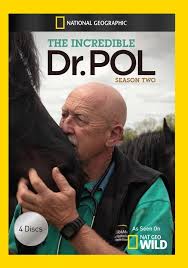 Not only is he Incredible, but he has quite the sense of humor also. Dr. Jan Pol describes what it was like to have a camera from Nat Geo watching your every move, including when his arm is two feet up a cow's ... well ... you know.
Not only is he Incredible, but he has quite the sense of humor also. Dr. Jan Pol describes what it was like to have a camera from Nat Geo watching your every move, including when his arm is two feet up a cow's ... well ... you know.
Dr. Pol was born and raised on a diary farm, and when he was 12 years old, the local veterinarian took him under his wing where he started delivering piglets. Yan thought was fun and that’s when he decided he wanted to become a veterinarian.
When Dr. Pol started veterinarian school in the Netherlands in 1962, there were 300 aspiring veterinarians in a room that would only fit 100. The students were told that, “If you want to become a veterinarian, fine, you want to practice, forget it!” So he decided to move to the United States.
When he first moved to Michigan, his practice was 80 percent dairy and he would do about 22 farm calls a day. There were about two dairy farms for every mile then, he says, but times have changed.
"The biggest problem (is that) the farmers are getting older, the kids don't want to take over, the farms are getting bigger all the time," he says. "The bigger the farm, the less we do."
Now, there are about 12 miles between dairy farms and Pol and one of his associates take large-animal calls for about three hours every afternoon in between small-animal examinations and surgeries. Another associate focuses on the small-animal business full-time.
"Quite a change from 30 years ago," Pol says. "You have to adapt otherwise you go out of business."
While Dr. Pol agrees that most farmers see their animals like dollars, he states that, “Farmers are not abusing their animals, because you abuse an animal, what does it do? It quits producing!”
Dr. Pol goes on to state that, “Animal abuse comes from people that have not grown up with animals from a very young age. They are the ones that don’t know how to treat them.”
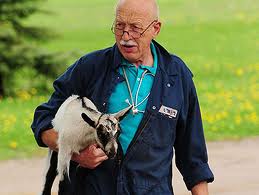 Dr. Pol tells us that the strangest animal that he treated in his practice as a pet was a hedgehog. He doesn’t understand how people can keep them as pets, as they are nocturnal, which means that they sleep during the day and are awake at night.
Dr. Pol tells us that the strangest animal that he treated in his practice as a pet was a hedgehog. He doesn’t understand how people can keep them as pets, as they are nocturnal, which means that they sleep during the day and are awake at night.
Dr. Pol travels across rural Michigan to care for every family pet and head of livestock in need of his expertise and kindness…no health insurance required! Treating numerous patients, including horses, pigs, cows, sheep, alpacas, goats, cats and dogs, Dr. Pol is not your average vet. A local legend making farm calls, Dr. Pol serves his patients with unmatched compassion, humor and expertise, treating all animals no matter their size or condition.
Dr. Pol says the best thing about his show was, “That nothing is rehearsed. The very first take better be the right one, because I’m not putting the calf back in the cow to pull it out again!”
Visit Website
 When Pet Food Is Medicine -Dr. Debbie
When Pet Food Is Medicine -Dr. Debbie
Proper pet nutrition is more than just diet choices for the healthy pet. It's even more important to properly feed the sick pet or those with chronic diseases. What you put in your pet's food bowl can help, or harm, his ability to cope with illness.
Peek into your average veterinary office and you'll likely find one or more brands of therapeutic diet foods created to manage pet specific pet health conditions. Veterinarians prescribe therapeutic diets to help pets with kidney disease, diabetes, pancreatitis, weight loss or heart disease. Special digestive diets may focus on hypoallergenic ingredients, fiber content or fat levels. Some diets prevent or dissolve mineralized stones in the urinary bladder. There are even diets to keep the spring in your arthritic dog's step and diets to aid in treating pets with cancer.
The grandfather of veterinary nutrition was Dr. Morris who in 1940 designed a diet to improve longevity of his dog, Buddy, who was a seeing-eye dog battling kidney disease. His efforts led to the introduction to Hill's K/D diet, a favorite diet used today for dogs and cats with kidney dysfunction. Today many more diets and conditions are addressed by companies such as Science Diet, Royal Canin, Purina and Iams.
As a veterinarian I recognize the value that therapeutic diets lend to managing my patients' health. But my strongest testament to their value is as a doggie momma who fed a therapeutic diet to my own dog, Magnum.
My Labrador Magnum suffered from food allergies with frequent facial skin infections, bad skin odor, scratching and unpleasant gastrointestinal signs with diarrhea and flatulence. After several diet trials with various hypoallergenic diet approaches, he then thrived on a rabbit based therapeutic diet by Royal Canin. His doggie kisses were sweeter smellin, he was content and he wasn't a walking gaseous explosion anymore.
But be prepared to dig deeper in your wallet for therapeutic diets. The research behind these foods will cost the consumer more than average pet foods. Just look at the example of Magnum's food. This diet runs $86 for a 25-pound bag of dry food. This sure isn't cheap. But the investment can pay off in lower medical costs and fewer veterinary visits, justifying the additional cost. In Magnum's case, we are able to avoid continued treatment of skin infections, thereby avoiding medication use and he is spared incessant itching.
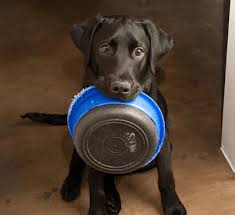 Some pet owners turn to home cooked diets in order to avoid the costs of therapeutic diets. Without guidance and veterinary nutrition analysis, pet owners may risk shortchanging their pet's nutrition. One research study identified that over 90-percent of home prepared diets for sick pets failed to be nutritionally adequate. Quality ingredients aren't cheap and a well-produced home cooked diet often ends up costing far more to prepare than commercially produced therapeutic diets.
Some pet owners turn to home cooked diets in order to avoid the costs of therapeutic diets. Without guidance and veterinary nutrition analysis, pet owners may risk shortchanging their pet's nutrition. One research study identified that over 90-percent of home prepared diets for sick pets failed to be nutritionally adequate. Quality ingredients aren't cheap and a well-produced home cooked diet often ends up costing far more to prepare than commercially produced therapeutic diets.
If your veterinarian recommends nutritional management with a therapeutic diet, discuss all the options with your doctor. Inquire about different brands and sizes of food packages available, as many options are available. Get your money's worth on these diets by following your veterinarian's recommendations. Avoid mixing therapeutic diets with regular foods. This only hinders your pet's results and give you a false sense of saving money by making the food last longer.
As for Magnum, I chose to feed him his therapeutic diet and avoid popping pills into him. That's my gauge of a therapeutic diet success - food that serves like medicine in the doggie bowl, but without the hassles.
Featured veterinarian known as "Dr. Debbie" on national pet radio program, Animal Radio. Ebook author of "Yorkshire Terriers: How to Be Your Dog's Best Friend"; "Pugs: How to Be Your Dog's Best Friend"; "Mini Schnauzers: How to Be Your Dog's Best Friend"; and "Shih Tzu: How to Be Your Dog's Best Friend." Dr. Debbie's books.
Visit Website
Animal Radio News with Stacey Cohen
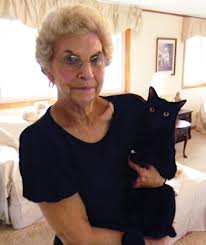 Cat Hitched Ride To Disney World
Cat Hitched Ride To Disney World
An Ohio woman said her pet cat had no intention of letting her visit the Happiest Place on Earth without him. The woman told the Orlando Sentinel that her 14-month-old feline managed to sneak into one of her bags undetected as she geared up for a few days at Disney World. He even got through airport security and took the flight from Columbus to Orlando. The woman said she had no idea that her cat was in her bag until she unzipped it at the hotel at the end of her ten-hour trip. And while the cat appeared a little shaken up from his journey, he still came out purring.
“Puppy” Pants Resulted In Animal Cruelty
A Colorado woman was arrested on suspicion of animal cruelty after allegedly shoving her Chihuahua puppy down her pants. The incident occurred during a domestic dispute in which policed found her arguing with a man. According to NBC affiliate KUSA in Denver, the woman had agreed to leave the premises, but insisted on taking her dogs with her. When police arrived, eyewitnesses told them to search her pants and when they did, a Chihuahua fell out. The puppy was unharmed but the woman was charged with one count of misdemeanor animal cruelty. She pleaded not guilty.
Stay of Execution for Pigs
About 200 pigs that were being transported to a slaughterhouse in central China were granted a stay of execution after a highway crash in which the truck carrying them smashed into a truck carrying whiskey. It took workers in China's Henan province five hours to clear the road of both pigs and smashed whiskey bottles. The pigs who survived the initial smash-up, though, dashed into nearby fields and found at least temporary freedom. "There were crops planted along the roadside and many of the pigs made straight for them and simply disappeared," a police spokesperson said.
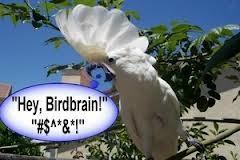 Foul Mouthed Cockatoo Offended Neighbors
Foul Mouthed Cockatoo Offended Neighbors
A Rhode Island woman's allegedly foul-mouthed cockatoo was being accused of ruining her neighbors' quality of life. The woman’s neighbors, her ex-husband and his girlfriend, said the woman trained her pet bird to yell curse words at them. In fact, the woman said that her bird’s fondness for four-letter words forced her to put her home on the market and find a new place to live. But even if the woman and her bird were found guilty of the violation, their lives probably wouldn’t be affected too much. The ordinance only carried a $15 fine.
What’s Next – Regulating Human Poop?
A homeowners association in Texas tried to collect samples of dog poop for DNA testing. The HOA said too many dogs were doing their business in common areas, and they wanted a database of DNA profiles. That way, future messes would be matched to the correct owners in the small condominium complex, who will then be fined. KXAN-TV reports a DNA testing company agreed to test poop samples for $30 per dog. Most neighbors seemed to agree that the plan goes too far. One even joked that if the HOA gets its way, then "Maybe they'll start regulating our poop" as well.
 Listen to the entire Podcast of this show (#1185)
Listen to the entire Podcast of this show (#1185)





